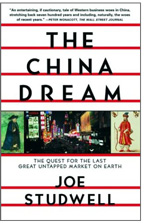|
Having a China Dream with
Joe Studwell
ChainLink: Joe,
please tell us a little about yourself.
Joe: Born in England, lived in Hong Kong, Beijing (8 yrs),
and I live in Italy now. I travel back and forth to China.
ChainLink: Do you still contribute to the Economist?
 Joe: I haven’t written for the Economist or the Economist
Intelligence Unit since 1999, though I’m sure I probably
will again at some point. Joe: I haven’t written for the Economist or the Economist
Intelligence Unit since 1999, though I’m sure I probably
will again at some point.
ChainLink: What made you write China Dream?
Joe: After eight years living in mainland China, I wanted
to figure out what I really believed about the place.
ChainLink: What made you start the China Economic
Quarterly?
Joe: I thought there was a niche for a very high quality
journal about the Chinese economy and investment in that
economy and I wanted to fill it.
ChainLink: From the beginning of global trade, business
people have dreamed of tapping into perceived large markets.
Yet both China and India have been elusive. The gold rush
is on, yet you are skeptical?
Joe: I’m skeptical about businessmen who think that
an economy, which is only the size of those of Spain and
the Netherlands combined is going to provide exponential
demand for their products and services. I’m enthusiastic
about businessmen who want to sell opportunistically to China
(as you would to any emerging market) and source cheap manufactured
goods from the place.
ChainLink: Joe, you talk about China’s two
economies: the so-called public government owned sectors
and the private
enterprise. Can you talk about what these are?
 Joe: The government still controls at least
half of all economic activity in China. State companies dominate
in construction,
heavy industry and services—like telecoms and finance.
Doing business with the state is difficult, bureaucratic,
time-consuming and subject to huge swings in demand. It’s
tough to win in this area. On the other hand, the emerging
domestic private economy and the export processing economies
are highly competitive and profit-driven, while demand is
much less volatile. This is where it makes sense to do business. Joe: The government still controls at least
half of all economic activity in China. State companies dominate
in construction,
heavy industry and services—like telecoms and finance.
Doing business with the state is difficult, bureaucratic,
time-consuming and subject to huge swings in demand. It’s
tough to win in this area. On the other hand, the emerging
domestic private economy and the export processing economies
are highly competitive and profit-driven, while demand is
much less volatile. This is where it makes sense to do business.
ChainLink:
How is a businessperson to sort out who/what he is dealing
with in these two economies?
Joe: You have to constantly ask where the money is coming
from in any particular business—from public or private
demand. It’s not that difficult to do if you apply
common sense. What you must not do is wander around the place
wide-eyed, mesmerized by construction activity that is paid
for through a nationalized and insolvent banking system.
To think only with your eyes in China will not tell you where
real, profitable business activity is.
ChainLink: I like the fact that you have significant
focus on the trials and tribulations of starting a business
in
the China market. I asked Richard Chenevix-Trench[1] about
these investments gone sour and some firms leaving China.
His comment
was, that it just takes time—lots of time. My rebuttal
was, "So, that should be considered a market research investment?[2]" .
He agreed. Do you see companies staying the course, or will
more throw in the towel on trying to
crack this market?
Joe: It’s a very difficult market and so it takes
more time to fathom than most. On top of this, the domestic
market is exaggerated in most people’s minds, so it’s
unusually competitive. But capitalism never gives up; it
just keeps trying. Right now, foreign companies in China
are doing better than ever. This isn’t to say they
are meeting their original expectations, but performance
is improving—from a very low base. The Chinese government
is helping out with a relentless deficit spending campaign
that began in the wake of the Asian financial crisis and
means there’s lots of extra cash sloshing about. I
suspect foreign companies’ performance in the domestic
market will continue to improve for several more years, right
up to the point where China can no longer head off a horrendous
financial crisis. At that point, the local market won’t
look too pretty.
ChainLink: One thing you talk about, which kind of alarmed
me, is the lack of central control in the Chinese government.
With the fall of totalitarianism and the rise of the provincial
wheeler-dealer environment in China, is this cause for concern,
or good news for firms trying to operate in this environment?
Joe: There’s no shortage of control in China, it’s
just unpredictable who is exercising it from one moment to
the next—central government or provincial chiefs or
village gauleiters. The political system has not been reformed
one bit since 1979, so with all these new social and economic
pressures playing on it, it is very creaky, very spluttery,
very difficult for the businessman to figure out. The best
thing is to operate in a business where you can avoid the
politics.
ChainLink: From a supply source (components and other manufacturing
capabilities), I guess the future there is basically a low
risk issue? Costs are so low, and discipline high, it becomes
very difficult for contract manufacturers in other parts
of the world to compete. Are there supply risks that you
think we should be concerned about?
Joe: I think supply risks are pretty low. Currency risk
is negligible because the exporters earn foreign currency
and so won’t be bothered by problems in the domestic
financial system down the road. Labour unrest risk is rising
a little, but in my experience young Chinese women, for instance,
think that working on a production line is a dream compared
to a life of cashless misery tending fields in the countryside.
Logistical risk is low because export processing is coastal,
and there are loads and loads of functioning mainland container
ports these days. Of course it is wrong to assume China will
make “everything.” At the bottom end, activity
like shoemaking has already migrated away to a significant
extent to Vietnam and Bangladesh. China is taking over a
lot of stuff from richer Southeast Asian nations, but there
are plenty of areas where China does not compete so well.
China is not, for instance, hollowing out the semiconductor
industry in the Philippines (which is instead a huge supplier
to China) or the software services industry in India.
ChainLink: Many of ChainLink’s customers have
big Intellectual Property problems as well as outbound
trade
issues (border crossing regulations, etc.) Do you see the
Chinese getting their act together on this?
Joe: I think the Chinese government will get tougher on
IPR infringements as they affect more Chinese companies,
which is beginning to happen. But it will be very slow. I
also think the IPR issue is mainly an issue of counterfeit
exports. In the domestic market, it’s just not true
to say that every Chinese who buys fake Microsoft software
or a fake Gucci handbag would or could shell out for the
real thing if piracy was eradicated. This is a poor country—US$1,000
GDP per capita. So when you hear that hundreds of millions
of dollars of Viagra sales are being lost because there are
50 fakes on the market, you should take it with a pinch of
salt.
ChainLink: Chinese are big savers—verses Americans.
I assume their savings are helping to fuel the investments
in these growing firms, like the Japanese did. Would China,
though, wind up with a crisis like Japan once they have a
convertible currency, which will lead to inflation?
Joe: Chinese people’s savings, gobbled up and lent
out by the nationalized banking system, are paying for all
those fancy high-rises. There won’t be a convertible
currency prior to a financial crisis because it would expose
the bankruptcy of the current financial system. So, all those
American politicians who are calling for one because (in
the short term) the renminbi is undervalued, are wasting
their time. But I guess they have to campaign about something—there’s
an election due.
ChainLink: Joe, this is fascinating stuff! Do you
have some advice, words of wisdom to our readership? (Readers
are composed
of software firms, SC exec’s—both manufacturing
and logistics, US Department of Defense Logistics, some financial
investors, and my mother, of course!)
Joe: Common sense. In general, there’s a correlation
between big multinationals in China with big dreams and “visionary” CEOs
and losing money, versus smaller foreign entrants that can’t
afford to waste cash that turn out successful. It’s
a place where you have to roll up your sleeves and get very
involved. That means finding the best possible local managers
and then trusting them to get on with the job. Oh—and
don’t accept different standards in China. You are
there to make a profit, just like everywhere else, not to
listen to some guff about x thousand years of history. Remember
what the guy in the movie kept saying to Tom Cruise and you’ll
be ok: “Show me the money!”
ChainLink: Joe, Grazie!
Xièxie!
Merci! Dhanyavaad!
[1]
Hedge Fund manager at Sloane Robison Management
[2]
$2B plus for GM is a pretty big market research
investment!
©2003
ChainLink Research, Inc.
|


